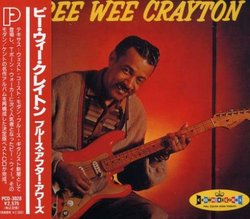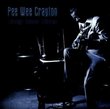| All Artists: Pee Wee Crayton Title: Blues After Hours Members Wishing: 1 Total Copies: 0 Label: P-Vine Japan Release Date: 3/5/2003 Album Type: Import Genres: Blues, Jazz, Pop, R&B Styles: Regional Blues, Texas Blues, West Coast Blues, Electric Blues Number of Discs: 1 SwapaCD Credits: 1 |
Search - Pee Wee Crayton :: Blues After Hours
 | Pee Wee Crayton Blues After Hours Genres: Blues, Jazz, Pop, R&B
Full title, Blues After Hours - The Essential. UK budget-price compilation for the late blues guitarist. 25 tracks including, 'Texas Hop', 'Don't Ever Fall In Love', 'Pee Wee Special', 'Central Avenue Blues' & 'I'm ... more » |
Larger Image |
CD DetailsSynopsis
Album Description Full title, Blues After Hours - The Essential. UK budget-price compilation for the late blues guitarist. 25 tracks including, 'Texas Hop', 'Don't Ever Fall In Love', 'Pee Wee Special', 'Central Avenue Blues' & 'I'm Still In Love With You'. Similar CDs
|
CD ReviewsPee Wee Crayton "Blues After Hours" Rene Sandoval | Fort Worth, TX USA | 08/18/2005 (5 out of 5 stars) "This is one of best blues albums I've heard in a long time. It mixes jazz, swing and blues into one and it sounds great. This was recorded in the 40's in Los Angeles and when I listen to some of the tracks I can just picture how cool it must have been to live in LA in the 40's. Some critics say that Pee Wee's guitar style imitated the great T-Bone Walker. In some ways it did, but i think Pee Wee had his own style, tone and sound that made him stand out. I would recommend this album to anyone that enjoys hardcore blues, jazz or swing." Uncle Connie Curtis "Pee Wee" Crayton... D. Burleigh | Vancouver, BC (Canada) & West Los Angeles, CA. (US | 04/28/2006 (5 out of 5 stars) "Although Uncle "Pee Wee" was certainly unremitting influenced by his close friend and pioneering mastre conception of the electric blues guitar, "T-Bone" Walker (what axe-handler wasn't during the immediate postwar era?); however, "Pee Wee" brought enough "heat" and daring innovation to his playing to avoid being labeled as a mere "T-Bone" Walker copy "kat." Crayton recorded over the years for Modern, Vee-Jay, Aladdin & Imperial Recordings and Blind Pig Records of which contains plenty of dazzling, marvelously imaginative guitar work and distinct vocals, especially on stunning instrumentals such as "Texas Hop," "Pee Wee's Boogie," and "Poppa Stoppa," all far more aggressive performances than Walker usually took part in...clearly no mis-understanding here with respect to "Bone," I have nothing but pure admiration for "T-Bone..." As a young teen in the early 70's, I was extremely fortunate to see both trailblazing "Axe-Men" ("Pee Wee" and "T-Bone" even though they were up in their later years) and experience the greatness of their "vibes" up close and personal... Other times, I would soak-up like a sponge and weld to memory those rare meetings when the "Texas 3" (1) Uncle "Pee Wee" (2) "T-Bone" Walker and (3) "Big Joe" Turner (another pioneering mastre blues singer, even though he was born in Kansas City, MO., he sang like he was from the state of Texas...) would get together at uncle "Pee Wee's" house in West Los Angeles, California and "jamm"/rehearse all day Saturdays or Sunday afternoons up until the late evenings (including some rare appearances from "Pee Wee's" nephew Marshal on Saxophone). On many occasions, all of this energy took place just before going to there "gig" at The Perisan Room (a defunct legendary popular "nite-spot" during the 1960's - late '80's located on the southwest corner of La Brea Avenue & Washington Blvd. of which now sits a U.S. Postal Station)-- exhilarating to say the least! *Note, this CD's title track "Blues after Hours" also shows up on the "Devil in a Blue Dress: Music From The Motion Picture Soundtrack;" as well as, in the film too (unaccredited by most noteworthy press media). And, no his music is not public domain yet... --A. David Burleigh (aka: "Big Dave") an 'AmeriCanadian' Record Producre/ Artist/ Singer-Songwritre." Pee Wee in his prime. 07/09/2000 (5 out of 5 stars) "Pee Wee's 1948 recordings. Smooth voice, and hell-bent guitar licks, and more. One of the best post-war blues recordings."
|

 Track Listings (19) - Disc #1
Track Listings (19) - Disc #1